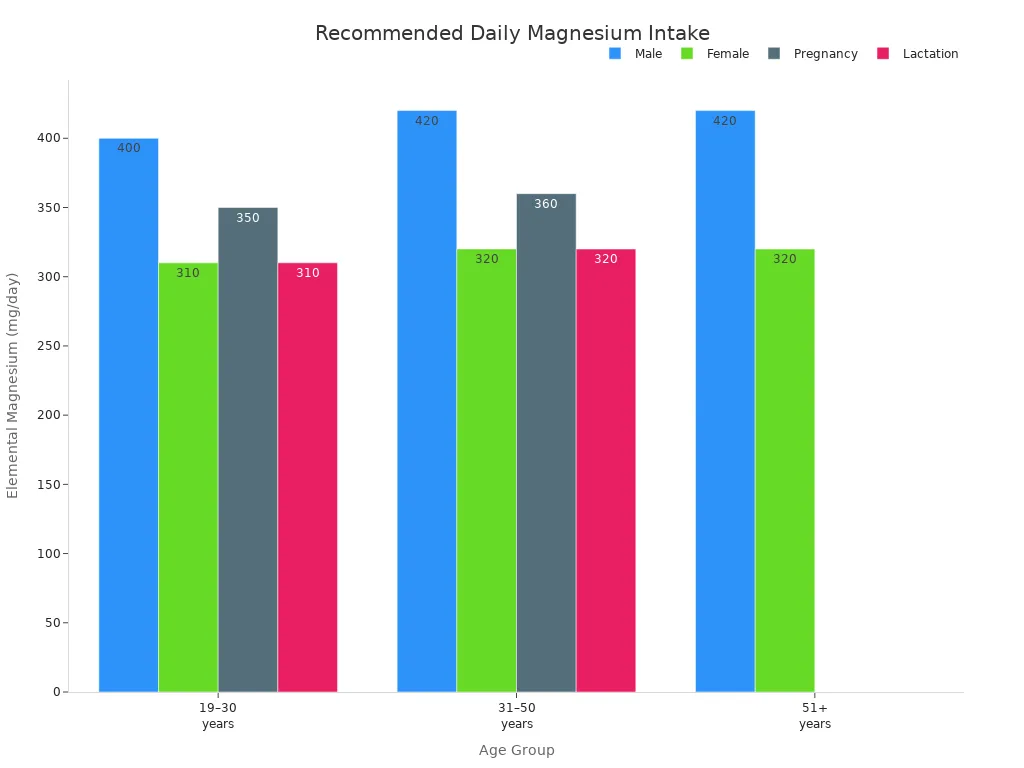How Magnesium Malate Powers Muscle Function and Energy
Table of Contents

Magnesium malate gives the body important support for energy production and muscle function. This supplement combines magnesium and malic acid, two nutrients that help cells create energy and keep muscles healthy. Many people choose magnesium malate as a supplement because it works well and absorbs easily. Some athletes and active individuals use magnesium malate to help their muscles recover and perform better. Others add this supplement to their daily routine for general wellness.
What Is Magnesium Malate?
Magnesium and Malic Acid
Magnesium malate is a chelated compound that combines magnesium with malic acid. This form appears in many fruits, especially apples. Magnesium is a mineral that helps muscles contract and nerves send signals. Malic acid plays a key role in the body’s energy production. It supports the malate-aspartate shuttle, which helps cells make energy inside mitochondria. When magnesium and malic acid join together, they create a supplement that supports both muscle function and energy metabolism.
Malic acid helps the body produce energy by moving molecules across cell membranes. Magnesium supports over 300 enzyme reactions, including those that help muscles work and nerves communicate. Together, these nutrients help people feel less tired and keep their muscles healthy.
People often choose magnesium malate for magnesium supplementation because it targets energy production and muscle fatigue. Athletes and active individuals use this supplement to help with muscle recovery and performance. Many others take magnesium malate to support bone health, sleep, and stress reduction.
Bioavailability
Bioavailability means how well the body absorbs and uses a nutrient. Magnesium malate stands out among magnesium supplements for its high absorption rate. Clinical studies show that organic magnesium compounds, such as magnesium malate, magnesium citrate, and magnesium acetyl taurate, are absorbed better than inorganic forms like magnesium oxide. Magnesium malate maintains higher serum magnesium levels for longer periods, which means the body can use it more effectively.
- Magnesium malate and magnesium citrate have superior absorption compared to other forms.
- Magnesium oxide and magnesium sulfate have lower bioavailability and are less effective for magnesium supplementation.
- The chelation process in magnesium malate helps it bypass the gut and enter the bloodstream efficiently.
| Magnesium Compound | Structure & Source | Absorption & Benefits |
|---|---|---|
| Magnesium Malate | Magnesium + malic acid (from fruits) | High bioavailability; supports energy & muscle |
| Magnesium Glycinate | Magnesium + glycine | Gentle on stomach; well absorbed |
| Magnesium Citrate | Magnesium + citric acid | Good absorption; helps with constipation |
| Magnesium Oxide | Magnesium oxide | Poor absorption; not recommended |
Magnesium malate offers a unique advantage for magnesium supplementation. Its combination of magnesium and malic acid helps the body absorb it efficiently, making it a popular choice for those seeking better energy and muscle support.
Magnesium Malate and Energy

ATP Production
Magnesium malate plays a vital role in supporting energy levels by helping cells make ATP, the main energy molecule. Magnesium acts as a cofactor for over 300 enzymes, including those that create ATP. Malic acid, found in magnesium malate, works as a key intermediate in the Krebs cycle, which is the body’s main pathway for energy production. When magnesium and malic acid combine, they help the body turn carbohydrates, fats, and proteins into usable energy.
| Component | Role in ATP Synthesis and Energy Metabolism |
|---|---|
| Magnesium | – Activates ATP by binding to it, forming magnesium-ATP. – Powers muscle contraction, nerve conduction, and hormone signaling. – Supports DNA replication. – Without enough magnesium, ATP cannot be used efficiently, leading to low energy levels and preventing fatigue. |
| Malic Acid | – Acts as a key intermediate in the Krebs cycle. – Drives ATP production from carbohydrates, fats, and proteins. – Supports efficient cellular energy generation. – Works with magnesium to boost endurance and exercise performance. |
Magnesium malate helps muscles use energy more efficiently. This combination supports muscle contraction and relaxation, which are important for exercise performance. When magnesium malate increases ATP production, people feel more energetic and less tired. Athletes and active individuals often notice better exercise performance and faster recovery.
Magnesium malate supports energy levels by making ATP more available to muscles. This process helps prevent fatigue and keeps muscles working at their best.
Krebs Cycle Role
The Krebs cycle is the main energy pathway inside cells. Magnesium malate boosts energy production by improving the efficiency of this cycle. Malic acid, a part of magnesium malate, acts as an intermediate in the Krebs cycle. It helps convert food into energy and supports key steps like the hydration of fumarate to malate and the oxidation of malate to oxaloacetate.
- Magnesium malate increases magnesium levels in muscle tissue, especially in muscles like the gastrocnemius and soleus.
- Higher muscle magnesium improves mitochondrial function and energy metabolism.
- Malic acid helps reduce lactic acid buildup, which can slow down muscles during exercise.
- Magnesium malate supports muscle strength and exercise performance by enhancing energy levels.
- The lipophilicity of magnesium malate allows better muscle uptake, leading to improved muscle energetics.
Magnesium acts as a catalyst in the Krebs cycle, helping enzymes work faster and more efficiently. Malic acid drives important reactions that keep the cycle moving. Together, magnesium and malic acid help muscles produce more energy and recover faster after activity.
Magnesium malate supports exercise performance by optimizing the Krebs cycle and ATP production. This process helps maintain high energy levels and prevents fatigue during physical activity.
Magnesium malate stands out among supplements for its ability to support energy production and exercise performance. People who use magnesium malate often report better energy levels, less muscle soreness, and improved endurance. This supplement helps both athletes and those seeking general wellness by preventing fatigue and supporting muscle function.
Muscle Function Support

Muscle Contraction
Magnesium malate plays a key role in muscle function by supporting proper muscle contraction and relaxation. Athletes often experience muscle cramps and spasms during intense exercise. Studies show that low magnesium levels can increase the frequency and severity of muscle cramps. In patients undergoing hemodialysis, hypomagnesemia affects about 10% to 20% of individuals, and researchers have observed a link between low magnesium and more frequent muscle cramps. Raising magnesium levels may help reduce these cramps, although more research is needed.
Magnesium helps regulate calcium flow in muscle cells. Calcium enters muscle cells to trigger contraction, and magnesium acts as a natural calcium blocker to promote relaxation. This balance ensures that muscles contract and relax smoothly, which is essential for exercise performance. Magnesium malate combines magnesium with malic acid, which supports energy production and reduces muscle fatigue. Athletes lose magnesium through sweat and urine, so supplementation helps maintain optimal muscle function and prevents cramps during intense exercise.
Controlled trials show that magnesium supplementation reduces muscle pain and inflammation after exercise. Magnesium also helps transport blood sugar into muscles and breaks down lactate, which reduces muscle tension and fatigue. These effects support better muscle contraction and relaxation cycles, allowing athletes to perform at their best and recover faster.
Maintaining healthy magnesium levels supports balanced muscle contraction and relaxation, which helps prevent cramps and twitching during exercise performance.
Recovery and Soreness
Muscle recovery and soreness are important concerns for athletes and active individuals. After intense exercise, muscles often feel sore due to tiny tears and inflammation. Magnesium malate supports muscle recovery by helping muscles produce energy and reducing inflammation. This process leads to less muscle soreness and faster recovery times.
Researchers have studied the effects of magnesium supplementation on muscle soreness and recovery. A double-blind study in 2022 found that taking 350 mg of magnesium daily for ten days reduced muscle soreness at 24, 36, and 48 hours after exercise compared to a placebo. Participants reported less soreness on a six-point scale, with magnesium reducing soreness by one to two units. Magnesium also improved perceived recovery and lowered ratings of perceived exertion after exercise. These benefits help athletes return to training sooner and maintain high exercise performance.
- Magnesium supplementation reduces muscle soreness after intense exercise.
- Participants in studies report improved muscle recovery and less soreness.
- Magnesium lowers inflammation markers, such as C-reactive protein, which helps muscles heal faster.
- Better sleep quality with magnesium supports muscle recovery and reduces soreness.
- Trends show improved exercise performance with magnesium, although not all results reach statistical significance.
Magnesium malate helps muscles recover by supporting ATP production and reducing delayed onset muscle soreness. Athletes often experience delayed onset muscle soreness after intense exercise, which can limit exercise performance and slow muscle recovery. Magnesium malate helps reduce soreness and supports faster muscle recovery, allowing athletes to train more effectively.
Magnesium malate supports muscle recovery and reduces muscle soreness, helping athletes and active individuals maintain high exercise performance and return to activity sooner.
Muscle soreness can affect anyone who participates in intense exercise, not just athletes. Magnesium malate offers support for muscle function, muscle recovery, and exercise performance by reducing soreness and promoting faster healing. People who use magnesium malate often report less muscle soreness, improved muscle recovery, and better exercise performance. This supplement helps maintain healthy muscle function and supports active lifestyles.
Benefits of Magnesium Malate
Exercise Performance
Magnesium malate offers several benefits for those who want to improve exercise performance. Many athletes and active individuals choose this supplement to help with muscle soreness after intense exercise. Magnesium malate supports energy production in muscle cells, which helps maintain high energy levels during workouts. When people exercise, their muscles use more energy and may develop soreness. Magnesium malate helps reduce muscle soreness by supporting ATP production and preventing fatigue.
Athletes often report less muscle soreness and faster recovery when they use magnesium malate. This supplement helps muscles recover from delayed onset muscle soreness, which can happen after intense exercise. People who experience soreness after workouts find that magnesium malate helps them return to activity sooner. Magnesium malate also helps prevent muscle soreness by supporting muscle function and energy levels.
Many users say magnesium malate helps them feel less tired and improves exercise performance. They notice less soreness and better endurance during physical activity.
A comparison of magnesium forms shows that magnesium malate absorbs well and supports muscle soreness relief. The table below highlights user-reported outcomes for different magnesium types:
| Magnesium Form | Primary Benefits and User-Reported Outcomes | Additional Notes |
|---|---|---|
| Magnesium Malate | Supports energy production and muscle pain relief, especially in fibromyalgia and chronic fatigue syndrome. Well tolerated with fewer digestive issues reported. | May absorb more easily than some other forms; supports mitochondrial function. |
| Magnesium Glycinate | Favored for improving sleep and reducing anxiety due to calming effects and high absorption. | Supports GABA neurotransmitter activity; gentle on the stomach. |
| Magnesium Threonate | Best for cognitive function; crosses blood-brain barrier effectively. | Enhances learning, memory, and synaptic density. |
| Magnesium Citrate | Commonly used for digestion and constipation relief. | Highly bioavailable; pulls water into intestines to relieve constipation. |
| Magnesium Oxide | Used mainly for short-term digestive relief such as heartburn and constipation. | Lower bioavailability; not ideal for long-term supplementation. |
| Magnesium Sulfate | Used for detoxification and relaxation, often topically (e.g., Epsom salt baths). | May allow some magnesium absorption through skin; more research needed. |
Reducing Fatigue
Magnesium malate helps reduce fatigue and muscle soreness after intense exercise. People with chronic fatigue syndrome or fibromyalgia often experience persistent soreness and low energy levels. Magnesium malate supports energy production, which helps manage these symptoms. Some studies show that magnesium supplementation can lower perceived fatigue and improve exercise performance. Women who took magnesium for four weeks reported less fatigue and soreness.
Magnesium malate works by supporting ATP production and preventing fatigue in muscle cells. This process helps reduce delayed onset muscle soreness and supports faster recovery. Athletes and active individuals notice less soreness and better energy levels when they use magnesium malate. The supplement helps muscles recover from soreness and maintain exercise performance.
- Magnesium malate supports energy levels and reduces muscle soreness.
- People with chronic fatigue syndrome and fibromyalgia may benefit from less soreness and improved energy production.
- Magnesium malate helps prevent fatigue and supports muscle function during intense exercise.
- Users report less soreness and better exercise performance after taking magnesium malate.
Magnesium malate offers benefits for reducing muscle soreness, improving energy levels, and preventing fatigue. Many people find that this supplement helps them recover faster and perform better during physical activity. 🏋️♂️
Safe Use and Dosage
How to Take
People who use magnesium supplementation should follow recommended guidelines for safety and effectiveness. The best time to take magnesium malate depends on personal health goals. Some people take it in the evening to support sleep and digestive health. Others prefer morning or early afternoon for energy and stress support. Athletes may use magnesium supplementation around exercise to help with muscle recovery.
Taking magnesium malate with food helps reduce stomach upset and improves absorption. Consistency is important. Regular magnesium supplementation gives the best results because the body absorbs magnesium gradually. Dosage should match age, activity level, and health needs. The table below shows the recommended daily intake for adults:
| Age Group | Male (mg/day) | Female (mg/day) | Pregnancy (mg/day) | Lactation (mg/day) |
|---|---|---|---|---|
| 19–30 years | 400 | 310 | 350 | 310 |
| 31–50 years | 420 | 320 | 360 | 320 |
| 51+ years | 420 | 320 | N/A | N/A |
The tolerable upper intake level for magnesium supplementation from supplements is 350 mg per day. Most adults do not need more than this unless a doctor recommends it.


People with kidney, heart, or digestive problems should avoid magnesium supplementation unless a healthcare provider approves it. Some medicines, such as antibiotics and diuretics, can interact with magnesium malate. Always check with a doctor before starting a new supplement.
Side Effects
Most people tolerate magnesium malate well when they use it as directed. The most common side effects of magnesium supplementation include diarrhea, bloating, and stomach cramps. These problems usually happen with high doses. Taking magnesium malate with food can help prevent stomach upset.
Other possible side effects are nausea and mild digestive discomfort. Rarely, people may experience low blood pressure, weakness, or heart problems if they take too much magnesium. Magnesium toxicity is very rare and usually affects people with kidney disease or those who take extremely high doses.
Tip: Start with a low dose of magnesium supplementation and increase slowly if needed. This helps the body adjust and lowers the risk of side effects.
Long-term studies show that magnesium malate is safe for most adults when they stay within the recommended limits. People with kidney disease, older adults, and young children have a higher risk of side effects. Anyone with health concerns should talk to a healthcare provider before using this supplement.
Magnesium malate supports energy levels and helps reduce muscle soreness for many people. This supplement improves exercise performance and helps muscles recover from soreness. Research shows magnesium malate offers benefits for those who want to manage soreness and boost energy levels. Magnesium supplementation can help prevent muscle soreness and support overall health.
For safe use, experts recommend:
- Start with a low dose and increase slowly.
- Take magnesium malate with meals to lower stomach upset.
- Watch for side effects like nausea, diarrhea, or stomach cramps.
- Talk to a healthcare provider before starting, especially if taking other medicines.
Magnesium malate helps people feel less soreness and supports muscle function. Choosing magnesium malate can help anyone who wants better energy levels, less muscle soreness, and improved exercise performance. Taking action for health today leads to a stronger tomorrow. 💪
FAQ
What is the best time to take magnesium malate?
Many people take magnesium malate with meals to improve absorption. Some choose morning for energy support. Others prefer evening to help with muscle recovery. The timing depends on individual goals and daily routines.
Can magnesium malate help with blood sugar regulation?
Magnesium malate may support blood sugar regulation. Studies show magnesium helps cells use glucose more efficiently. People with healthy magnesium levels often experience better control of blood sugar throughout the day.
Is magnesium malate safe for children?
Doctors recommend magnesium malate for children only when needed. Parents should consult a healthcare provider before giving supplements. Proper dosage and safety depend on age and health status.
Does magnesium malate affect mood disorders?
Some research suggests magnesium malate may help with mood disorders. Magnesium supports nerve function and may improve feelings of well-being. People with low magnesium sometimes report more mood changes.
Can magnesium malate interact with medications?
Magnesium malate can interact with some medicines, including antibiotics and diuretics. People should talk to a doctor before starting magnesium malate if they take prescription drugs.

Poseidon
Master of Nutritional Epidemiology, University of Copenhagen, Herbal Functional Nutrition Researcher
Focus: The scientific application of natural active ingredients such as Tongo Ali, Horny Goat Weed, and Maca to sexual health and metabolic regulation.
Core Focus:
Men: Use a combination of Tongo Ali (an energizing factor) + Maca (an energy reserve) to improve low energy and fluctuating libido.
Women: Use a combination of Horny Goat Weed (a gentle regulator) + Maca (a nutritional synergist) to alleviate low libido and hormonal imbalances.
Stressed/Middle-Aged Adults: This triple-ingredient synergy supports metabolism, physical strength, and intimacy.
Product Concept:
Based on traditional applications and modern research (e.g., Tongo Ali promotes testosterone-enhancing enzyme activity, and icariin provides gentle regulation), we preserve core active ingredients and eschew conceptual packaging—using natural ingredients to address specific needs.
Simply put: I'm a nutritionist who understands "herbal actives." I use scientifically proven ingredients like Tongo Ali, Epimedium, and Maca to help you make "sexual health" and "nutritional support" a daily routine.
